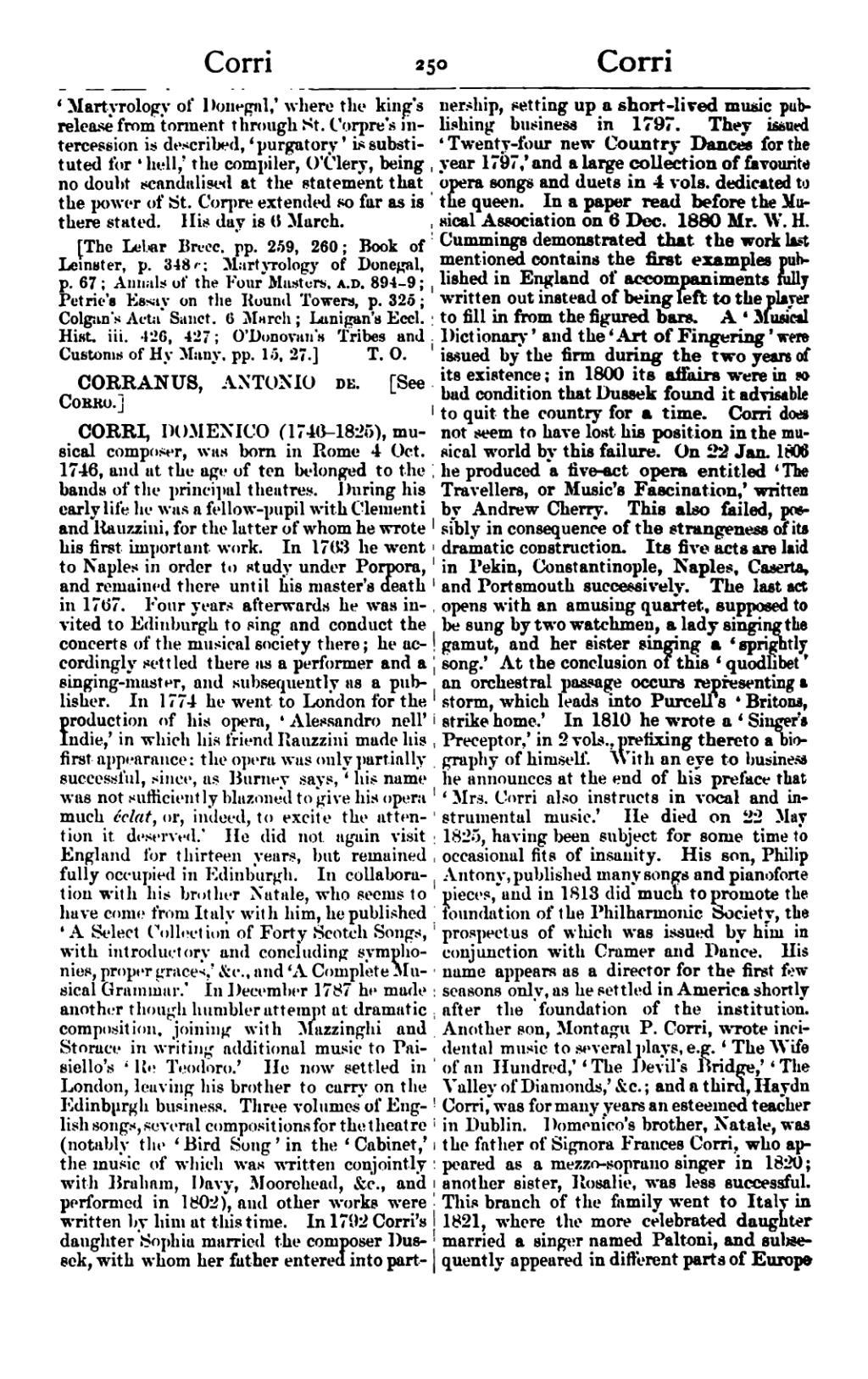‘Martyrology of Donegal,’ where the king's release from torment through St. Corpre's intercession is described, ‘purgatory’ is substituted for ‘hell,’ the compiler, O'Clery, being no doubt scandalised at the statement that the power of St. Corpre extended so far as is there stated. His day is 6 March.
[The Lebar Brecc, pp. 259, 260; Book of Leinster, p. 348 e; Martyrology of Donegal, p. 67; Annals of the Four Masters, A.D. 894–9; Petrie's Essay on the Round Towers, p. 325; Colgan's Acta Sanct. 6 March; Lanigan's Eccl. Hist. iii. 426, 427; O'Donovan's Tribes and Customs of Hy Many, pp. 15, 27.]
CORRANUS, ANTONIO de. [See Corro.]
CORRI, DOMENICO (1746–1825), musical composer, was born in Rome 4 Oct. 1746, and at the age of ten belonged to the bands of the principal theatres. During his early life he was a fellow-pupil with Clementi and Rauzzini, for the latter of whom he wrote his first important work. In 1763 he went to Naples in order to study under Porpora, and remained there until his master's death in 1767. Four years afterwards he was invited to Edinburgh to sing and conduct the concerts of the musical society there; he accordingly settled there as a performer and a singing-master, and subsequently as a publisher. In 1774 he went to London for the production of his opera, ‘Alessandro nell' Indie,’ in which his friend Rauzzini made his first appearance; the opera was only partially successful, since, as Burney says, ‘his name was not sufficiently blazoned to give his opera much éclat, or, indeed, to excite the attention it deserved.’ He did not again visit England for thirteen years, but remained fully occupied in Edinburgh. In collaboration with his brother Natale, who seems to have come from Italy with him, he published ‘A Select Collection of Forty Scotch Songs, with introductory and concluding symphonies, proper graces,’ &c., and ‘A Complete Musical Grammar.’ In December 1787 he made another though humbler attempt at dramatic composition, joining with Mazzinghi and Storace in writing additional music to Paisiello's ‘Re Teodoro.’ He now settled in London, leaving his brother to carry on the Edinburgh business. Three volumes of English songs, several compositions for the theatre (notably the ‘Bird Song’ in the ‘Cabinet,’ the music of which was written conjointly with Braham, Davy, Moorehead, &c., and performed in 1802), and other works were written by him at this time. In 1792 Corri's daughter Sophia married the composer Dussek, with whom her father entered into partnership, setting up a short-lived music publishing business in 1797. They issued ‘Twenty-four new Country Dances for the year 1797,’ and a large collection of favourite opera songs and duets in 4 vols. dedicated to the queen. In a paper read before the Musical Association on 6 Dec. 1880 Mr. W. H. Cummings demonstrated that the work last mentioned contains the first examples published in England of accompaniments fully written out instead of being left to the player to fill in from the figured bars. A ‘Musical Dictionary’ and the ‘Art of Fingering’ were issued by the firm during the two years of its existence; in 1800 its affairs were in so bad condition that Dussek found it advisable to quit the country for a time. Corri does not seem to have lost his position in the musical world by this failure. On 22 Jan. 1806 he produced a five-act opera entitled ‘The Travellers, or Music's Fascination,’ written by Andrew Cherry. This also failed, possibly in consequence of the strangeness of its dramatic construction. Its five acts are laid in Pekin, Constantinople, Naples, Caserta, and Portsmouth successively. The last act opens with an amusing quartet, supposed to be sung by two watchmen, a lady singing the gamut, and her sister singing a ‘sprightly song.’ At the conclusion of this ‘quodlibet’ an orchestral passage occurs representing a storm, which leads into Purcell's ‘Britons, strike home.’ In 1810 he wrote a ‘Singer's Preceptor,’ in 2 vols., prefixing thereto a biography of himself. With an eye to business he announces at the end of his preface that ‘Mrs. Corri also instructs in vocal and instrumental music.’ He died on 22 May 1825, having been subject for some time to occasional fits of insanity. His son, Philip Antony, published many songs and pianoforte pieces, and in 1813 did much to promote the foundation of the Philharmonic Society, the prospectus of which was issued by him in conjunction with Cramer and Dance. His name appears as a director for the first few seasons only, as he settled in America shortly after the foundation of the institution. Another son, Montagu P. Corri, wrote incidental music to several plays, e.g. ‘The Wife of an Hundred,’ ‘The Devil's Bridge,’ ‘The Valley of Diamonds,’ &c.; and a third, Haydn Corri, was for many years an esteemed teacher in Dublin. Domenico's brother, Natale, was the father of Signora Frances Corri, who appeared as a mezzo-soprano singer in 1820; another sister, Rosalie, was less successful. This branch of the family went to Italy in 1821, where the more celebrated daughter married a singer named Paltoni, and subsequently appeared in different parts of Europe
